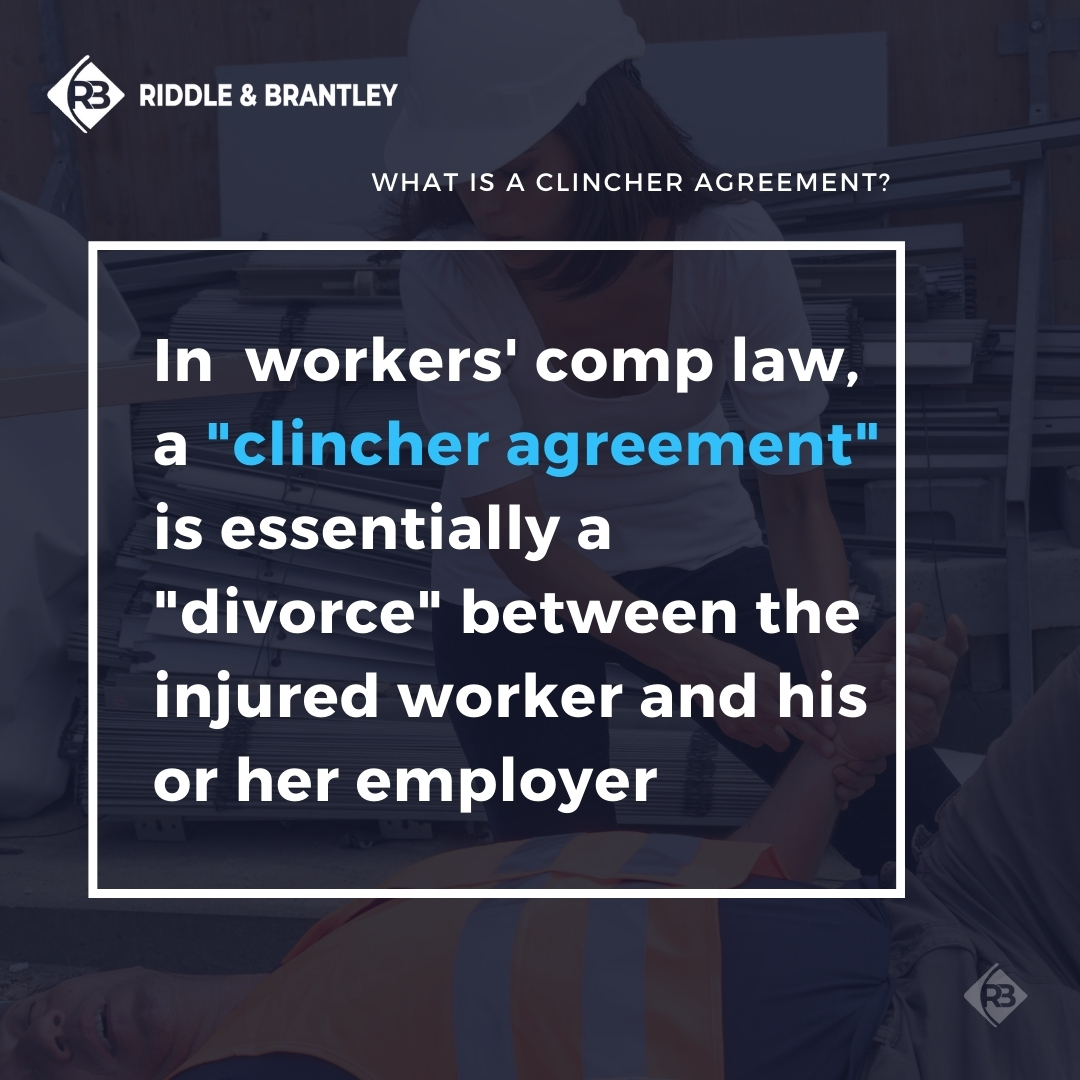What is a Clincher Agreement in a Workers’ Compensation Claim in North Carolina?
What is a “clincher agreement” in a workers’ comp case in North Carolina?
In North Carolina, worker’s compensation attorneys commonly refer to settlement agreements as “clincher agreements.” The term is a slang or short-hand term, so if you start reviewing actual statutes or appellate decisions, you won’t see much or any mention of the term, since the formal name for such an agreement is a “compromise settlement agreement.”
What Goes Into a Clincher Agreement in a Workers’ Comp Case
 So, people always ask us, “What is my case worth if I settle my case?” Well, that is a hard question, because under North Carolina’s worker’s compensation laws, clincher agreements are not required, and indeed, were not even contemplated when the statutes were originally drafted.
So, people always ask us, “What is my case worth if I settle my case?” Well, that is a hard question, because under North Carolina’s worker’s compensation laws, clincher agreements are not required, and indeed, were not even contemplated when the statutes were originally drafted.
The workers’ compensation system was designed to provide a safety net to people who are hurt on the job. Injured workers are supposed to get quick access to reasonable care. They are entitled to receive weekly temporary total indemnity payments as replacement for wages or salary they miss while out of work. They can even be entitled to re-education and retraining services or other vocational assistance to help them locate new employment.
However…
The workers’ compensation system IS NOT designed to pay an injured worker a large lump sum payment for what they have gone through. Workers’ comp does not compensate for pain and suffering. An injured worker is not entitled to a jury. An injured worker can never stand in front of a judge and ask them to award him a settlement for what he has been through.
An injured worker can, however, be entitled to a rating payment. Typically towards the end of his or her recovery, an injured worker will be assigned a Permanent Partial Impairment Rating. And that rating can entitle the claimant to some amount of money. But those rating payments are usually very modest, and often it is not wise for the claimant to even elect to receive those payments if the injured worker has not yet returned to work.
That said, even though the workers’ comp system is not designed to pay out a lump sum, there is another type of total settlement, often called a “clincher agreement.”
“So what is a ‘Clincher Agreement’?”
When you hear about people who got big payouts as part of a workers’ compensation settlement, those payments are almost certainly the result of a clincher agreement. In a clincher agreement, the injured worker and the employer and/or insurance company for the employer usually are agreeing to a full and final buyout of the entire claim.
As part of such a settlement, the injured worker typically waives his rights to everything under the Workers’ Compensation Act: weekly disability checks, medical care, etc. The injured worker usually also has to resign his employment from the company, and agree not to reapply to the company in the future.
What Determines the Amount of a Clincher Agreement in a Workers’ Comp Case?
 There is no set way to calculate what amount a case should “clincher” for. In effect, a clincher agreement is a divorce. And the amount agreed to by the parties is simply the amount that both sides agree as the price that makes it worthwhile for both sides to walk away from the claim and buy that divorce.
There is no set way to calculate what amount a case should “clincher” for. In effect, a clincher agreement is a divorce. And the amount agreed to by the parties is simply the amount that both sides agree as the price that makes it worthwhile for both sides to walk away from the claim and buy that divorce.
The injured worker gets a lump sum payment, but in exchange he or she gives up his or her job, and must find a new way to make a living and to obtain any additional medical care he or she might need in the future. The employer and/or the insurance company have to cut a large settlement check, and in exchange they achieve cost certainty and no longer have to worry about paying the injured worker over the next few months or years.
“Does it make sense to take a clincher in a workers’ comp claim?”
In some instances, it is best for both sides to settle a claim by clincher agreement. If the injured worker wants to see doctors of his or her own choosing, and has access to health insurance, a clincher can be a good idea. If the injured worker wants to take a lump sum payment and start his or her own business, then a clincher can be a jumpstart on a new chapter of life. But of course, the price has to be right.
Contact an Experienced North Carolina Workers’ Comp Lawyer
If you or a loved one is thinking about settling a worker’s compensation claim, we strongly encourage you to retain an attorney who is experienced in negotiating settlements in such claims, to ensure you get the maximum amount you can possibly obtain.
Our workers’ comp team has experienced handling all types of workers’ compensation cases for injured North Carolina workers, and we’re proud of the results we’ve secured for our clients (see disclaimer below), including:
- $2,475,000 — We fought for justice for a man who was seriously injured in a fall from a platform while working as a welder. He suffered debilitating brain injury and required lifetime care. We negotiated a total settlement with the workers’ comp carrier for $2.475 million, and helped set up a guardianship and two trusts to help ensure his long-term care and well-being.
- $1,800,000 — Attorney Gene Riddle represented a truck driver who lost his left leg below the knee after being hit by another truck while on the job. In separate settlements, we obtained a total of $1.8 million from the workers’ comp carrier and the truck insurance company for our injured client.
- $800,000 — Our client was struck by a tree while scouting cell towers for work and suffered a disabling head injury and several fractures. Attorney Chris Brantley obtained a life care plan, calculated damages, and secured an $800,000 total settlement from the workers’ compensation insurance company. The insurer also paid for all medical expenses and we even helped ensure that a significant medical lien was waived for our client.
*** Disclaimer: The results mentioned are intended to illustrate the type of cases handled by the firm. These results do not guarantee a similar outcome, and they should not be construed to constitute a promise or guarantee of a particular result in any particular case. Every case is different, and the outcome of any case depends upon a variety of factors unique to that case.
“It was nice to see Riddle & Brantley put me and my needs first.”
–R. Colley, Riddle & Brantley client
There are no upfront costs and we don’t get paid unless you do. If we don’t get you workers’ compensation benefits, you won’t pay any attorney fees. It’s as simple as that.
You don’t have to go through this alone. Let us handle the complicated legal details so that you can focus on what’s most important — your recovery, and improving your quality of life.